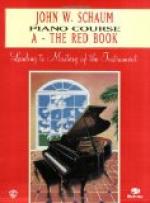“There is quite a variety of views as to what the essentials of piano technic are; this is a subject on which teachers, unluckily, do not agree. For instance, on the point of finger lifting there is great diversity of opinion. Some believe in raising the fingers very high, others do not. Lifting the fingers high is not good for the tone, though it may be used for velocity playing. I use quite the reverse where I wish beautiful, singing, tone quality. The young pupil, at the beginning, must of course learn to raise fingers and make precise movements; when greater proficiency is reached, many modifications of touch are used. That the best results are not more often obtained in piano teaching and study, is as much the fault of the teacher as the pupil. The latter is usually willing to be shown and anxious to learn. It is for the teacher to correctly diagnose the case and administer the most efficient remedy.
[Illustration: To Miss Harriett Brower with the kindest of remembrances, Sigismond Stojowski New York, April 1913]
NATURAL TECHNIC
“There is a certain amount of what I might call ‘natural technic’ possessed by every one—some one point which is easy for him. It Is often the trill. It has frequently come under my notice that players with little facility in other ways, can make a good trill. Some singers have this gift; Mme. Melba is one who never had to study a trill, for she was born with a nightingale in her throat. I knew a young man in London who was evidently born with an aptitude for octaves. He had wonderful wrists, and could make countless repetitions of the octave without the least fatigue. He never had to practise octaves, they came to him naturally.
“The teacher’s work is both corrective and constructive. He must see what is wrong and be able to correct it. Like a physician, he should find the weak and deficient parts and build them up. He should have some remedy at his command that will fit the needs of each pupil.
“I give very few etudes, and those I administer in homeopathic doses. It is not necessary to play through a mass of etudes to become a good pianist. Much of the necessary technic may be learned from the pieces themselves, though scales and arpeggios must form part of the daily routine.
KEEPING UP A REPERTOIRE
“In keeping a large number of pieces in mind, I may say that the pianist who does much teaching is in a sense taught by his pupils. I have many advanced pupils, and in teaching their repertoire I keep up my own. Of course after a while one grows a little weary of hearing the same pieces rendered by students; the most beautiful no longer seem fresh. My own compositions are generally exceptions, as I do not often teach those. To the thoughtful teacher, the constant hearing of his repertoire by students shows him the difficulties that younger players have




